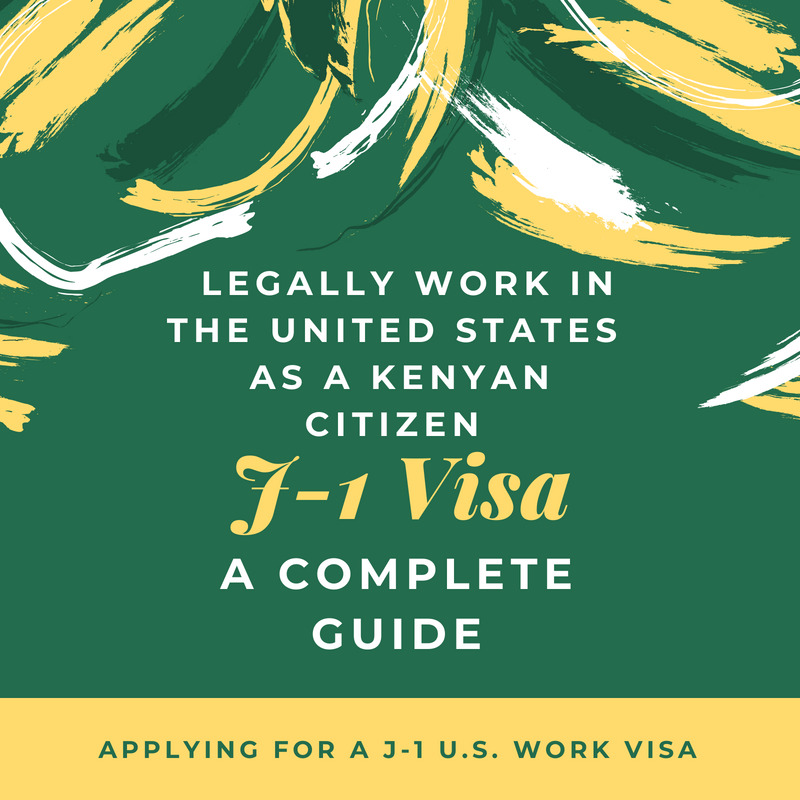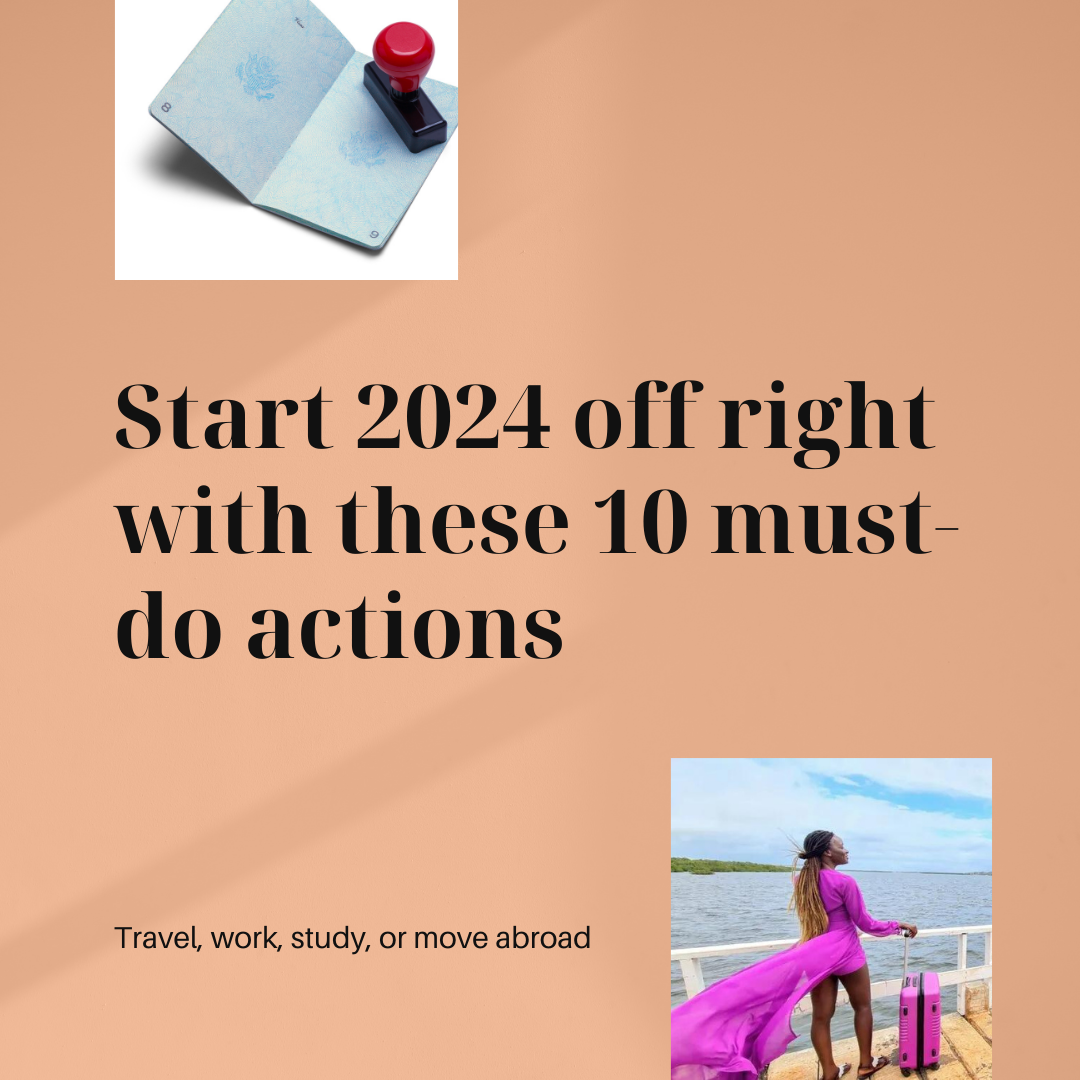 This is a complete guide for getting a J1 US work visa that enables you to legally work in the United States of America with your Kenyan passport.
This is a complete guide for getting a J1 US work visa that enables you to legally work in the United States of America with your Kenyan passport.
Whatever your reasons are for wanting to visit the land of ‘milk and honey’, #iwish, if traveling and working legally in the US is one of them, then the US J1 work visa’s got your covered.
Through the J1 visa, Kenyans can travel and work legally in the United States for different designated organizations.
Looking to Work & Travel in the USA?
What's Covered in This Article
J-1 US Visa Overview
A J–1 visa is a non-immigrant visa issued by the United States to people interested in educational, cultural, and professional exchange programs, especially with the goal to acquire education, art, science, medical or business training within the United States.
Eligibility for participation is based on willingness to study, to work for pay, to travel, and to share your home culture and learn about the US Culture.
How to Apply for the J-1 Visa Work Programs
STEP 1: Determine which program is best for you.
See this program requirements comparison chart for an overview of each program category.
STEP 2: Locate and contact a J sponsor directly to take part in one of its exchange programs.
To apply for a J1 visa, you will need to find a sponsor from this official list of designated sponsor organizations to enroll you into their program.
Search designated sponsors here.
Find sponsors that operate in Kenya by clicking here and then choosing ‘Kenya’ from the drop down list.
- The application process differs from one organization to another. The sponsor will provide you with specific program and application requirements.
- Sponsors are responsible for participants selection, as well as supporting and monitoring them during their entire program.
- Sponsors charge participants program fees.
- Fees vary from sponsor to sponsor.
- You are encouraged to request for a breakdown of all costs and fees from multiple sponsors beforecommitting to a program.
- As you seek sponsorship, keep in mind factors such as program duration, program location, your skills, and interests. Level of proficiency in the English language is another determining factor.
For instance: Disney International Program
Check out the job summary available here to determine your eligibility, then apply.
The International Culinary Training Program is a twelve-month internship located at Walt Disney World® Resort, near Orlando, Florida.
Through the program, participants will be exposed to all areas of the kitchen operation, including the financial aspects of a food and beverage operation.
In return, you will share information with guests and other team members information about Kenyan culture, heritage, cuisine and traditions while working at Disney’s Animal Kingdom Lodge – which is a representation of a real African lodge. the participant will share from their native land.
The pay $12.95 per hour.
STEP 3: If approved for J1 sponsorship, you will receive your forms DS-2019
Use the information in the Form DS 2019 to apply for your visa at the US embassy in Nairobi.
Here is a sample DS-160 form in case you wish to preview it first.
STEP 4: Pay the Student and Exchange Visitor Information System (SEVIS)
SEVIS fees can be paid for at www.fmjfee.com/.
- Remember to print out your proof of payment for your personal records.
STEP 5: Fill out an Online Nonimmigrant Visa Application Form DS-160
US visa application Form DS-160 is available at the U.S. Department of State website.
STEP 6: Pay the visa application fee of $160 via M-Pesa.
READ THIS POST: For the rest of the process on how to apply for a US non-immigrant visa in Kenya.
STEP 7: Schedule your interview
- Your passport
- The MRV fee receipt
- The ten (10) digit barcode number from your DS-160 confirmation page
- Details about your past US visas if you’ve previously been to the US
Documents Required to Obtain a J1 Visa:
These are the documents required in order to apply for a J1 Visa:
- An approved DS-2019 Form, Certificate of Eligibility for Exchange Visitor Status which you get from your sponsor.
- A DS-7002 Form, A Training/Internship Placement Plan (for exchange visitor trainees or intern visa applicants)
- Form DS-160, Online Non- immigrant Visa Electronic Application which you fill out and submit online.
- One recent passport sized photograph (2” x 2”):
- When you submit your visa application online, you are also required to upload a photograph. Please click here for photo guidelines.
- A recent passport – size photo. One (1) 2″x2″ (5cmx5cm) which must comply with the photo specifications.
- The receipt of the US$160 non-refundable nonimmigrant visa application processing fee. This is required unless your J program is sponsored by the US Government (with a program code beginning with a “G”). This shall be paid in local currency and will vary upon the current exchange rate.
- Form I-901 SEVIS fee and proof of payment.
- You will be required to pay a SEVIS I-901 fee to the Department of Homeland Security (DHS) as part of your J-1 visa application
- Alternatively, if this fee is already included as part of your program fees to your sponsoring organization, then the sponsor pays the SEVIS fee on your behalf.
- Make sure to get a receipt confirming payment in such instances.
- Proof of payment is required before your exchange visitor visa is issued
- Most exchange visitors with Form DS-2019 pay a US$180.00 SEVIS fee.
- Payments cannot be made at the U.S. Embassy. Only via M-Pesa, Post Bank, or CBA.
- Instructions for paying the SEVIS fee can be found here.
STEP 8: Attend your J-1 visa interview at the US embassy
- If approved, continue working with your sponsor for the rest of the steps and for guidance on your impending experience in the United States.
- Most sponsors will provide a J1 Pre-Departure Orientation Booklet for your convenience, complete with all of the information you may need to prepare for your US experience.
- Be sure to double check your employment dates and camp arrival expectations with your sponsor before leaving Kenya.
- You will not be allowed entry into the US more than one month before employment start date.

FAQS about US J-1 Visa:
1. How will I know whether my visa is approved or rejected?
The visa interviewing officer will inform you whether or not you visa is approved.
If it is approved, they will retain your passport to embedd the visa on it.
2. If I have a B1/B2 non-immigrant tourist visa, do I still have to go through this entire process?
Yes.
Your J1 visa is to give you permission to work legally in the US. B1/B2 is a visit visa and you’re strictly not allowed to work. If found, you can be deported and never allowed on US soil again.
3. My passport has expired but my visa is still valid. What happens?
Simply apply for a new passport and make sure to always carry the old passport with visa on it whenever you’re traveling to the US.
4. Can I apply for an extension of my J1 visa?
No. You can’t extend the J1 visa. You have to apply for a new visa.
5. I got my J1 visa. When can I travel to the US?
You can only enter the United States not more than 30 days from the beginning of your work program, as indicated on your Form DS-2019, irrespective of when your visa is issued.
6. What is the ‘Two Year Rule’?
This means that as a J-1 visa holder who is subject to the two–year home residency requirement (or 212(e), you cannot become a permanent US resident, change status in the U.S., or get work or family-based visa status (such as H, L or K) until you return back to Kenya for a total of two years or obtain an approved waiver of this requirement .
9. How do I know whether the Two-Year Rule applies to me?
You (and your J-2 dependents) can become subject if any of the following apply to the J-1 program:
- If you funding from the U.S. government, home government or an international organization to use for the J-1 program.
- If you worked or studied in a field that appears on the “skills list.” This is a list of fields of specialized knowledge and skills that are needed in the J-1’s country of last permanent residence for its development.
- If you participated in a graduate medical training program in the United States under the sponsorship of the Educational Commission for Foreign Medical Graduates.
A simplified overview of who is subject to the 2-year home residency requirement is given in this chart.
If you are certain of whether you should be subject to the 2-year home residency requirement, please contact your sponsor.
10. Will they pay me to work under the J1 program?
Yes. The pay is usually pegged around US$ 10/hr. Some programs pay a few dollars more.
11. Can I stay longer than the term of the program?
Nope!
You must come back home.
12. Is there an age limit to it?
It varies by sponsor. Some sponsors have an age limit while others do not. Best to always confirm Otherwise, you’ll end up wasting your time.
13. What if my visa is rejected?
No worries, you can always re-apply! Just make sure that the circumstances that led to your denial have now changed considerably.
Are you on Pinterest? Pin this for Later!





